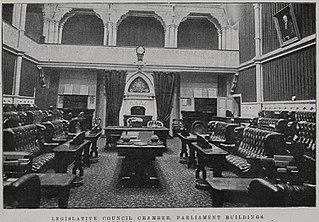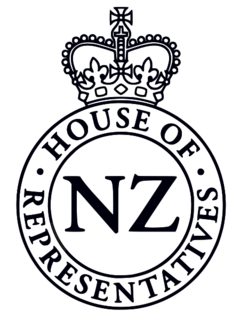Related Research Articles

The New Zealand Legislative Council existed from 1853 until 1951. An earlier arrangement of legislative councils for the colony and provinces existed from 1841 when New Zealand became a colony; it was reconstituted as the upper house of a bicameral legislature when New Zealand became self-governing in 1852, which came into effect in the following year.

Sir Francis Henry Dillon Bell was a New Zealand lawyer and politician who served as the 20th prime minister of New Zealand from 14 to 30 May 1925. He was the first New Zealand-born prime minister, holding office in a caretaker capacity following the death of William Massey.

Gordon Glendinning Grieve was a New Zealand politician of the National Party.
Egmont is a former New Zealand electorate, in south Taranaki. It existed from 1871 to 1978.

The 11th New Zealand Parliament was a term of the Parliament of New Zealand.

The 29th New Zealand Parliament was a term of the Parliament of New Zealand. It opened in 1950, following the 1949 general election. It was dissolved in 1951 in preparation for the 1951 general election. The governing Labour Party had been defeated in the election by the National Party. This marked the end of the First Labour government and the beginning of the First National government.

Alexander Paterson O'Shea was a New Zealand shepherd, clerk, farmers' union leader, political lobbyist and meat industry representative. He was a member of the New Zealand Legislative Council and when he died in 1990, he had been its last surviving member.
Hoeroa Taraua Utiku Marumaru (1890–1952) was a prominent figure in the Anglican Church and in the National Party, where he was Māori vice-president between 1945 and 1948 as well as in 1952. He was born in Parewanui, and educated at Te Aute College.
Agnes Louisa Weston from Wellington was appointed a member of the New Zealand Legislative Council on 22 June 1950.
Cheviot Wellington Rangi Dillon Bell of the Wairarapa was appointed a member of the New Zealand Legislative Council in 1950 as part of National's suicide squad.

Andrew Henson Allen was a New Zealand businessman and politician. He served as mayor of Dunedin from 1938 to 1944, and was briefly a member of the Legislative Council.
Leonard Allen Alexander was a New Zealand politician, appointed a member of the New Zealand Legislative Council on 22 June 1950.
Bruce McLeod (1890–1966) of Colyton near Feilding was appointed a member of the New Zealand Legislative Council on 22 June 1950.
Neill Aylmer Rattray was a member of the New Zealand Legislative Council, a farmer, and a war veteran of both world wars.
Charles Gilbert White was a New Zealand lawyer and politician. He was appointed a member of the New Zealand Legislative Council on 22 June 1950.
The suicide squad in New Zealand was a so-nicknamed group of New Zealand Legislative Councillors appointed in 1950 by Prime Minister Sidney Holland tasked with voting the New Zealand Legislative Council out of existence.

Thomas Brindle was a British-born early activist for the New Zealand Labour Party who was jailed during World War I for speaking out against conscription. He was a member of Wellington City Council and stood for election to the House of Representatives five times. He was a member of the Legislative Council from 1936 until March 1950.

Eliot Rypinski Davis was a member of the New Zealand Legislative Council from 22 June 1934 to 21 June 1941 when his term ended; then from 8 September 1941 to 7 September 1948 and 8 September 1948 to 31 December 1950 when the Council was abolished. He was appointed by the United/Reform Coalition Government then the First Labour Government.

The 1865 Town of New Plymouth by-election was a by-election held in the Town of New Plymouth electorate during the 3rd New Zealand Parliament, on 19 May 1865. The by-election was caused by the resignation of the incumbent, Charles Brown, and was won unopposed by Henry Sewell. Whilst Sewell was not a local resident, he was a member of the government through his appointment to the Legislative Council, the upper house of Parliament. Sewell accepted the invitation to represent the electorate, as him becoming a member of the lower house was seen to strengthen the government.

In the New Zealand Parliament, the Leader of the House is the government minister appointed by the Prime Minister of New Zealand to be responsible for the management of government business in the House of Representatives. The Leader of the House is also an ex officio member of the Parliamentary Service Commission.
References
- 1 2 Wilson, J.O. (1985) [1913]. New Zealand Parliamentary Record 1840–1984 (4th ed.). Wellington: V.R. Ward, Government Printer. p. 167.
- ↑ Scholefield, Guy (1951). Who's Who in New Zealand, 1951 (5th ed.). Wellington: A.H. & A.W. Reed. p. 257.